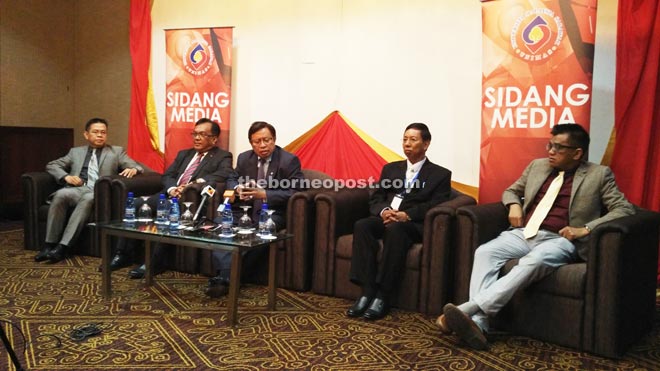Negotiation hits snag as MAB board of management mulls making MASwings its own regional airline

Abang Johari (centre) speaking at the press conference after opening the CoCIAF 2015. Also seen are (from right) Shazali, Dr Thein, Kadim and Mohammad Abdullah.
KUCHING: Negotiations on taking over MASwings are still ongoing but moving slowly and cautiously after Malaysia Airlines was taken over by a new management.
This was revealed by Tourism Minister Datuk Amar Abang Johari Tun Openg yesterday, who said stakeholders from Sabah and Sarawak were anticipating another meeting with Khazanah Nasional Berhad and Malaysia Airlines Berhad (MAB) sometime in the next two months.
“The plan can only materialise when there are no objections from the federal government for Sabah and Sarawak to take over the operations of MASwings,” he told a press conference after opening the 2nd International Conference on Contemporary Issues in Accounting and Finance (CoCIAF) 2015 at Hilton Hotel here.
“I’ve had meetings with Khazanah CEO and MAB Board of Management two months ago,” he revealed.
He said the state’s proposal, which the Sabah government had agreed to, was to make MASwings a regional airline to serve routes with fight duration within seven hours to destinations like Bali, Jakarta, Bangkok, Tokyo and Australia.
“MAB can continue to be the premium airline much like Cathay Pacific which is complemented by its regional airline Dragon Air and similar to Singapore Airline (SIA) and Silk Air,” he pointed out.
However, the MAB board of management had been hesitant and silent upon hearing the proposition because it had intention of making MASwings its regional airline too.
“With the new management, I think they are still thinking about the possibility,” he added.
However, Abang Johari remained optimistic that the plan could materialise due to strong economic justifications, especially the huge tourism potential in Sabah and Sarawak.
On another development related to the CoCIAF, he admitted that the Goods and Services Tax (GST) definitely had an impact on rural people but said it was unavoidable.
“While Sarawak continues to retain the Sales Tax, we however do not want to burden the people,” he said.
“So it will be part of the devolution of power to negotiate and engage with the federal government to secure our benefits from the GST collection,” he highlighted.
He explained that Sarawak, being an equal partner in Malaysia, needed to negotiate and understand better how the federal government would distribute the collection.
“It may not come in monetary term but perhaps by giving more projects to Sarawak,” he said.
GST is a sophisticated yet complex form of taxation, but Abang Johari assured that the Sarawak and the federal governments could work out the benefits.
CoCIAF 2015 is jointly organised by Universiti Malaysia Sarawak (Unimas), Securities Industry Development Corporation (SIDC) and Malaysian Institute of Accountancy (MIA).
The conference themed ‘Theory Meets Practice’ from Oct 8 to 10 serves as an important platform for academicians, researchers, industry practitioners, policy makers to interact and exchange viewpoints and research findings on contemporary issues in Accounting and Finance.
It is attended by some 100 delegates from various countries including Iran, Japan, Indonesia, Myanmar, Bangladesh and Malaysia.
Also present were Unimas vice chancellor Prof Dato Dr Mohamad Kadim Suaidi, Cooperative University of Thanlyin, Myanmar rector Prof Dr Thein Tun, Dean of Faculty of Economics and Business of Unimas Prof Dr Shazali Abu Mansor and CoCIAF 2015 organising chairman Dr Muhammad Abdullah Zaidel.
